
Genocide .live

Al-Farra family - Sheikh Nasser
Gaza, Khan Younis, Sheikh Nasser
30 October, 2024
At least 3 martyred
At 1 am, Israeli strikes targeted the Al-Farra family house in Sheikh Nasser area, east of Khan Younis. Three people were killed including one woman and one child (girl).
According to journalist Hassan Slayeh, both the family's home and tent were bombed simultaneously. The victims include the brother of photojournalist Soliman Al-Farra.
This was the second massacre perpetrated against the Al-Farra family within a week and the 4th massacre to affect the extended Al-Farra family since October 2023:
- On October 25, 2024, the family's house in Al-Manara neighborhood of Khan Younis was completely pulverized by Israeli bombing, killing at least 15 members of the family, 14 of which children.
- On October 2, 2024, Dr. Al-Farra's family home in Al-Manara neigborhood was completely destroyed by violent strikes, killing at least 20 members.
- On October 25, 2023, the family of journalist Al-Farra was bombed while he was on the cover.
**Names of the martyrs:**
1. [Abduljawad Abdulhamid Al-Farra](https://x.com/Qadeyah1/status/1851535782420353268/photo/1) (61 y/o)
2. Areej Abduljawad Al-Farra (27 y/o, Abduljawad's daughter))
3. Jood Nasser Al-Farra (7 y/o, granddaughter))
(Sources [1](https://x.com/ShehabAgency/status/1851431319848567006) [2](https://x.com/mohshoaibfarra/status/1851431206904045985))
Al-Louh family massacre - Beit Lahia
Gaza, Beit Lahia, North Gaza
29 October, 2024
At least 18 martyred
Around [6:40 pm](https://x.com/dn_osama_rabee/status/1851303031549374786), an Israeli airstrike targeted a residential block in the vicinity of Salim Abu Musallam Mosque in Beit Lahia. The bombing leveled more than 3 houses of Al-Louh family to the ground.
The houses were inhabited and – like the Abu Nasr family massacred early morning – was [sheltering people displaced](x.com/Hakeam_ps/status/1851314182953501087) from other parts of North Gaza.
The initial toll is at more than 30 people killed, of which 16 have been recovered.
This massacre is perpetrated amid a the total absence of ambulances and civil defense, forced nuder Israeli threats to leave North Gaza since a week ago
**Names of the martyrs (identified):**
1. Fathi Al-Masry "Abu Fadi"
2. Sabah Al-Masry "Umm Fadi"
3. Mohamed Fathi Al-Masry
4. Mona Fathi Al-Masry
5. Mona Fathi Al-Masry's first child
6. Mona Fathi Al-Masry's second child
7. Mona Fathi Al-Masry's third child
8. Mona Fathi Al-Masry's fourth child
9. Rami Al-Louh “Abu Al-Amir”
10. Malak Fathi Al-Masry 'Umm Al-Amir"
11. Rami Al-Louh's first child
12. Rami Al-Louh's second child
13. Rami Al-Louh's third child
14. Rami Al-Louh's fourth child
15. Rami Al-Louh's fifth child
16. Rami Al-Louh's sixth child
17. Laila Rami Al-Louh
18. Laila Rami Al-Louh's daughter
([Source](https://x.com/Qadeyah1/status/1851326788443475990))
#### Photos:
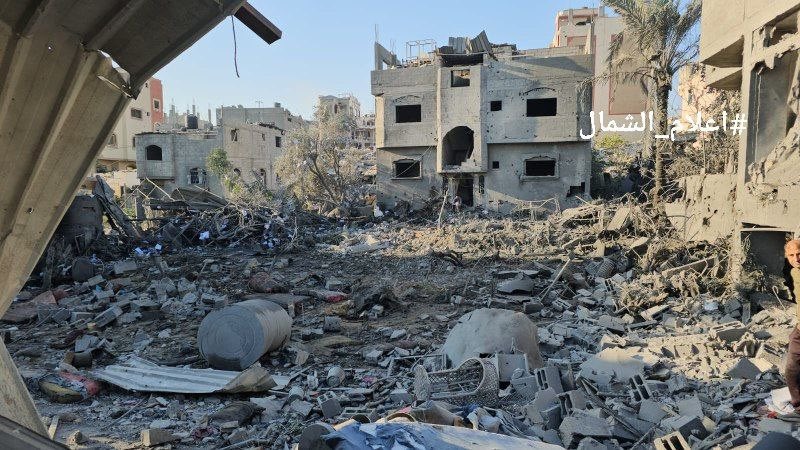
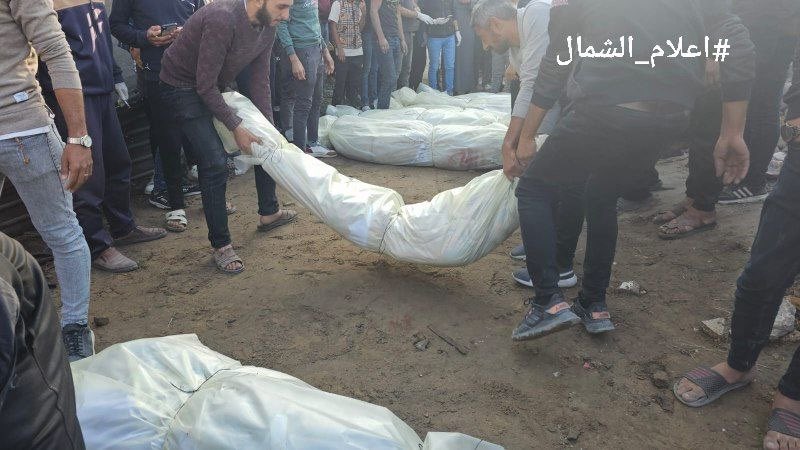
6 killed awaiting aid near the beach - Gaza Coty
Gaza, Gaza City
29 October, 2024
At least 6 martyred
Around 5 pm, an Israeli strike targeted a group of people **awaiting aid**, including some aid security personnel, on Al-Rashid Street in Al-Soudaniya area near Al-Khalidi Mosque, Gaza City. **6 people were killed and dozens injured**. Crews were able to [evacuate 39 injuries](https://x.com/Hamzaalnamla1/status/1851569777522659530). Whereas the dead were mostly recovered the next morning, under drone threat.
**Names of the martyrs:**
1. Mohammed Mouin Al-Madhoun (42 y/o)
2. Omar Mohammed Abu Sharia (15 y/o)
3. Shahda Saleh Al-Qanou (46 y/o)
4. Ahmed Attia Al-Qanou (56 y/o)
5. Bilal Shahda Hasbullah (29 y/o, aid security crew)
6. Ayoub Mohammed Al-Najjar (30 y/o)
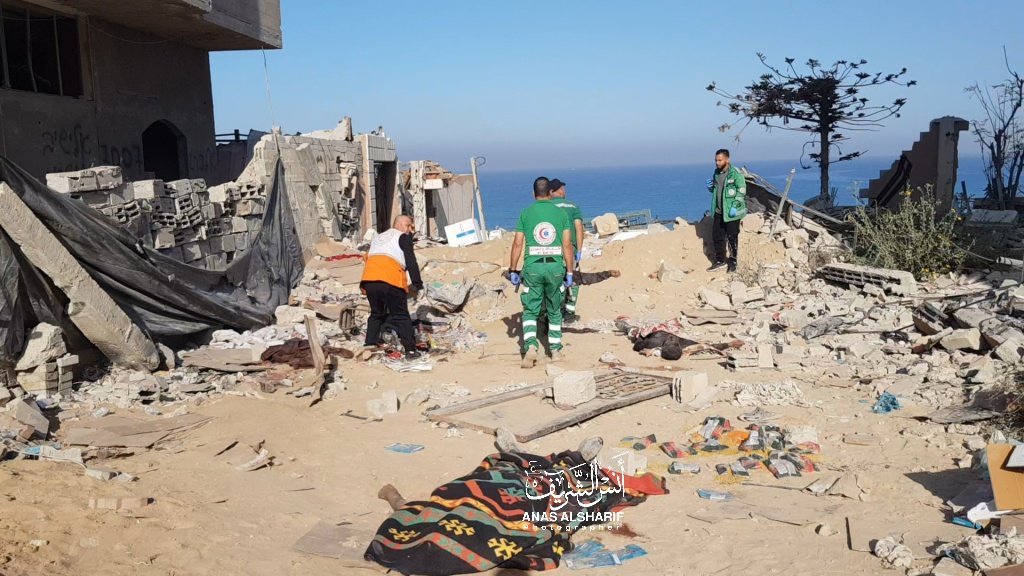
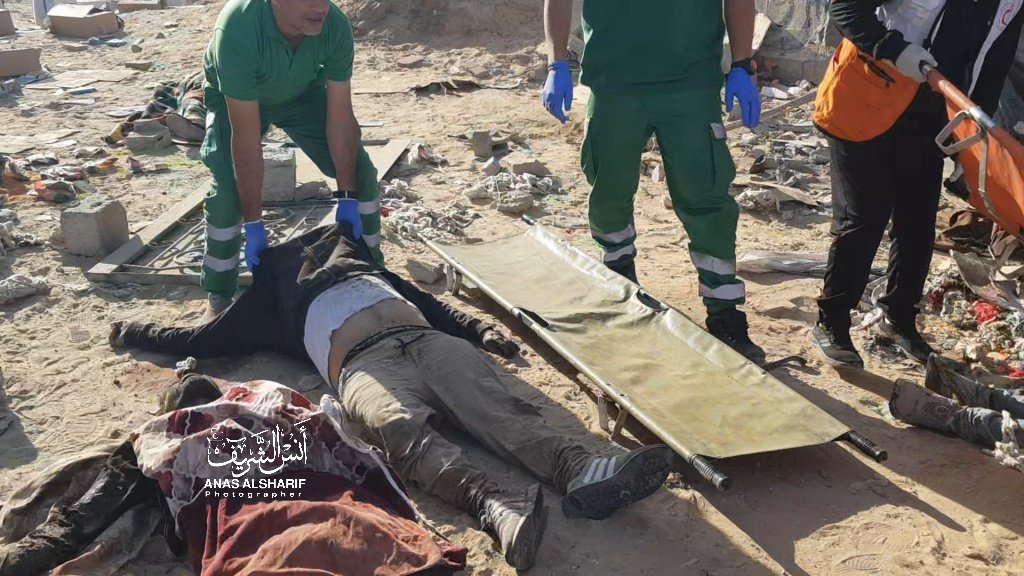



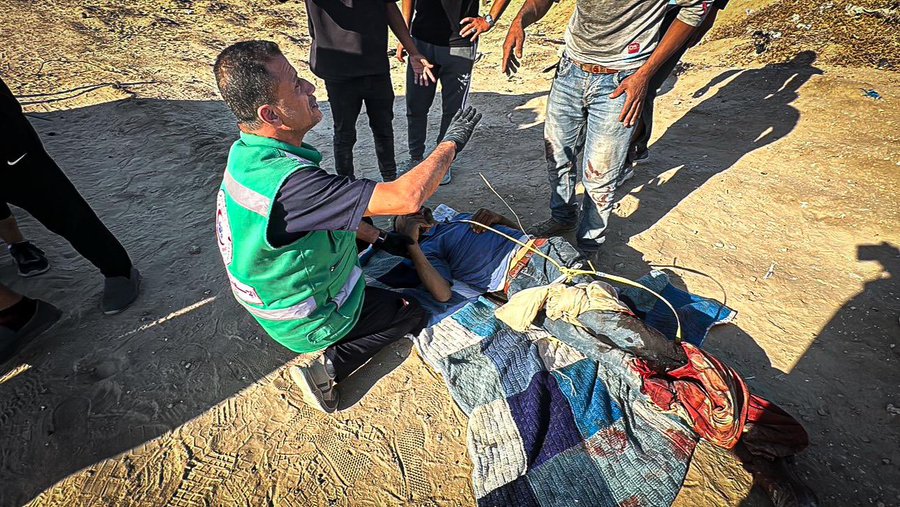
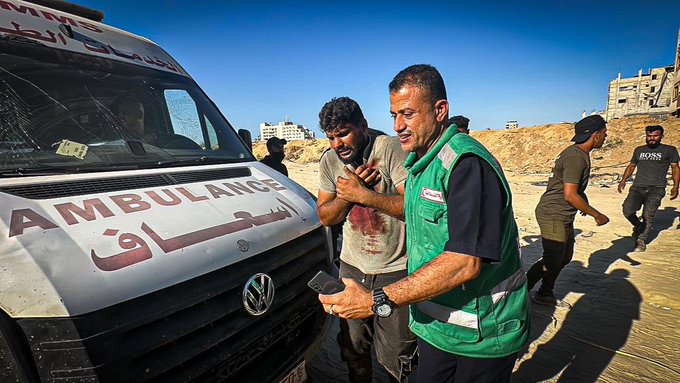
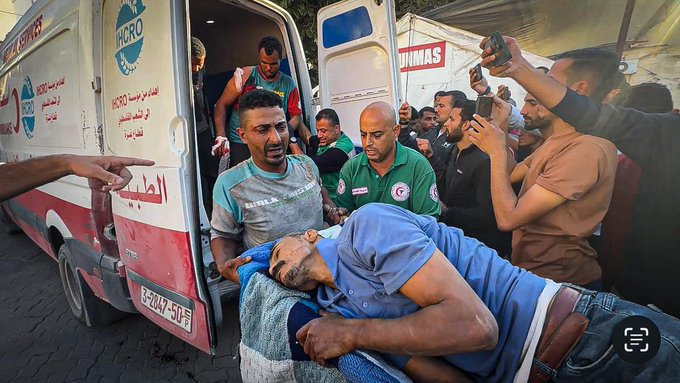

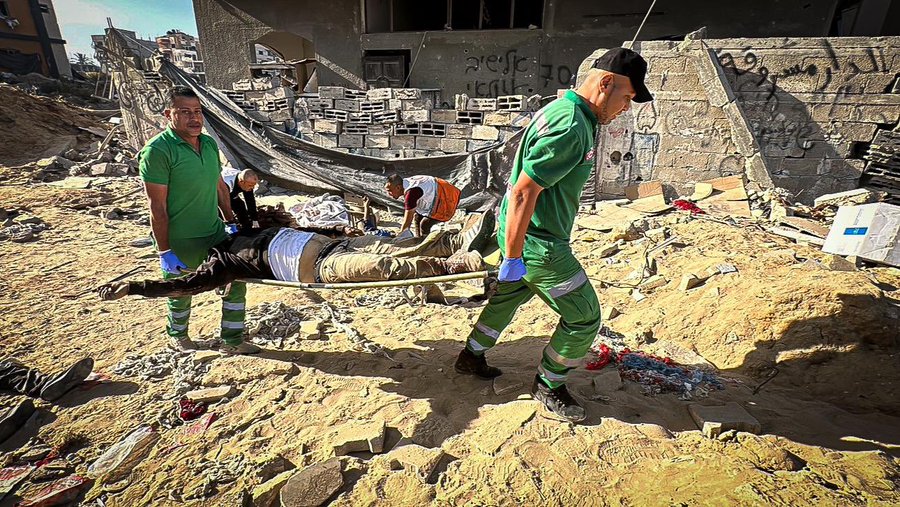
Al-Nafaq (Sahaba) market massacre, Gaza City
Gaza, Gaza City, Al-Daraj
29 October, 2024
At least 4 martyred
Around 3:30 pm, an Israeli drone strike targeted a store in the middle of the densely crowded Al-Naffaq (Al-Sahaba) popular market in Gaza City [twice](https://x.com/qudsn/status/1851261592911913018).
The initial toll reached 4 killed and 30 wounded and is likely to increase.
**Names of the martyrs (identified):**
1. Sami Abu Shaaban "Abu Abdullah"
2. Saneer Abu Shaaban 'Umm Abdullah"
Murder in displacement tent in Al-Mawasi
Gaza, Khan Younis, Al-Mawasi
29 October, 2024
At least 2 martyred
An afternoon Israeli strike targeted displacement tents behind Bir Al-Shaer in Al-Mawasi area of Khan Younis. [Two people were killed](x.com/Hamzaalnamla1/status/1851246587332235723) and other injured were taken to the Kuwait Specialized Hospital.
**Names of the martyrs:**
1. Thaer Hamdan Ibrahim Barhoum (32 y/o)
2. Alaa Ziad Fathi Al-Ghoul (34 y/o, journalist Abdallah Al-Attar's [cousin](x.com/abdallahatar/status/1851261048621298072))
Youth shot dead by drone - Bureij
Gaza, Deir al-Balah, Bureij
29 October, 2024
At least 1 martyred
Amir Masoud Abu Jari was shot dead by a drone when it fire on a group of people at the entrance to Al-Bureij camp in the central Gaza Strip.
([Source](https://x.com/Hamzaalnamla1/status/1851227826533363808))
4 people killed in Al-Saftawi
Gaza, Gaza City, Al-Saftawi
29 October, 2024
At least 4 martyred
An Israeli strike on a group of poeple killed four people on Ahmed Yassin Street, in Saftawi, northwest of Gaza City.
([Source](x.com/Hamzaalnamla1/status/1851209129085268411))
Al-Nahhal family boys killed in Khirbat al-Adas
Gaza, Rafah, Khirbat al-Adas
29 October, 2024
At least 2 martyred
Two young boys were killed in Israeli midday attacks in Khirbat Al-Adas, Rafah.
**Names of the martyrs:**
1. Hamada Saber Al-Nahhal
2. Yahya Mosleh Al-Nahhal
([Source](https://x.com/Hamzaalnamla1/status/1851202718729113725))
Abu Nasr family massacre
Gaza, Beit Lahia, North Gaza
29 October, 2024
At least 126 martyred
Early morning (3 am), residents of the Abu Nasr family house sent out appeals for rescue after the five-storey house in the Beit Lahia project was bombed by Israeli forces. [93 people were killed](https://x.com/mahmoadbasal/status/1851244738613068149). Dr. Abu Safiya, director of Kamal Adwan hospital stated that the hospital received [70 martyrs and 80 injured](https://x.com/Hamzaalnamla1/status/1851335649711751563) from the Abu Nasr family massacre.
### [Update Nov 1, 2024:](https://x.com/mahmoadbasal/status/1852413794653266328)
Locals retrieved the **bodies of 117 people**, whereas **another 137 remain under the rubble**, most likely passed away.
The family had [offered shelter](https://x.com/Yusuf198989/status/1851170680517124230) from the Israeli onslaught to displaced people, as many had moved from Jabalia to Beit Lahia. There were about [300 people](https://x.com/AbdSabbah91/status/1851160928852529651) in the house when it was bombed
The Euro-Mediterranean Human Rights Monitor [reported](https://euromedmonitor.org/ar/article/6528) that the house sheltered about 200 people and collected testimonies from survivors and claims that an American MK-84 bomb weighing 908 kilograms was used. The information is yet to be verified by weapons experts, noting that no fragments of the bomb were found on the scene yet.
One of the very few **survivors**, Muhammad Nabil Issa Baraka Abu Nasr, **insisted** in a testimony that the house was not struck with a bomb, but rather with **barrel bombs**. He added that they found family members were **flung all across neigborhood buildings** from the sheer force of the explosion.
Another survivor stated to EuroMed HR Monitor that his wife and four children were among the dead. He himself was flung dozens of meters away by the force of the blast, injuring him all over his body. He was only rescued by locals who took him to Kamal Adwan Hospital, where he has been awaiting transfer to Al-Awda Hospital for surgery.
### [Update Feb 3, 2025](https://x.com/eman_ps/status/1886463576044376492)
Eman Mustafa, a member of the family who lost her uncle Alaa Asfoura and her cousins shared an update. Amid Civil Defense effort to identify as many of the dead interred in mass fraves, the crews retrieved some of the corpses of the family members from the Beit Lahia market, which was turned into a cemetery during the North Gaza siege.
Eman emphasized that the bodies of a large number of family members is still presumably buried under the rubble.
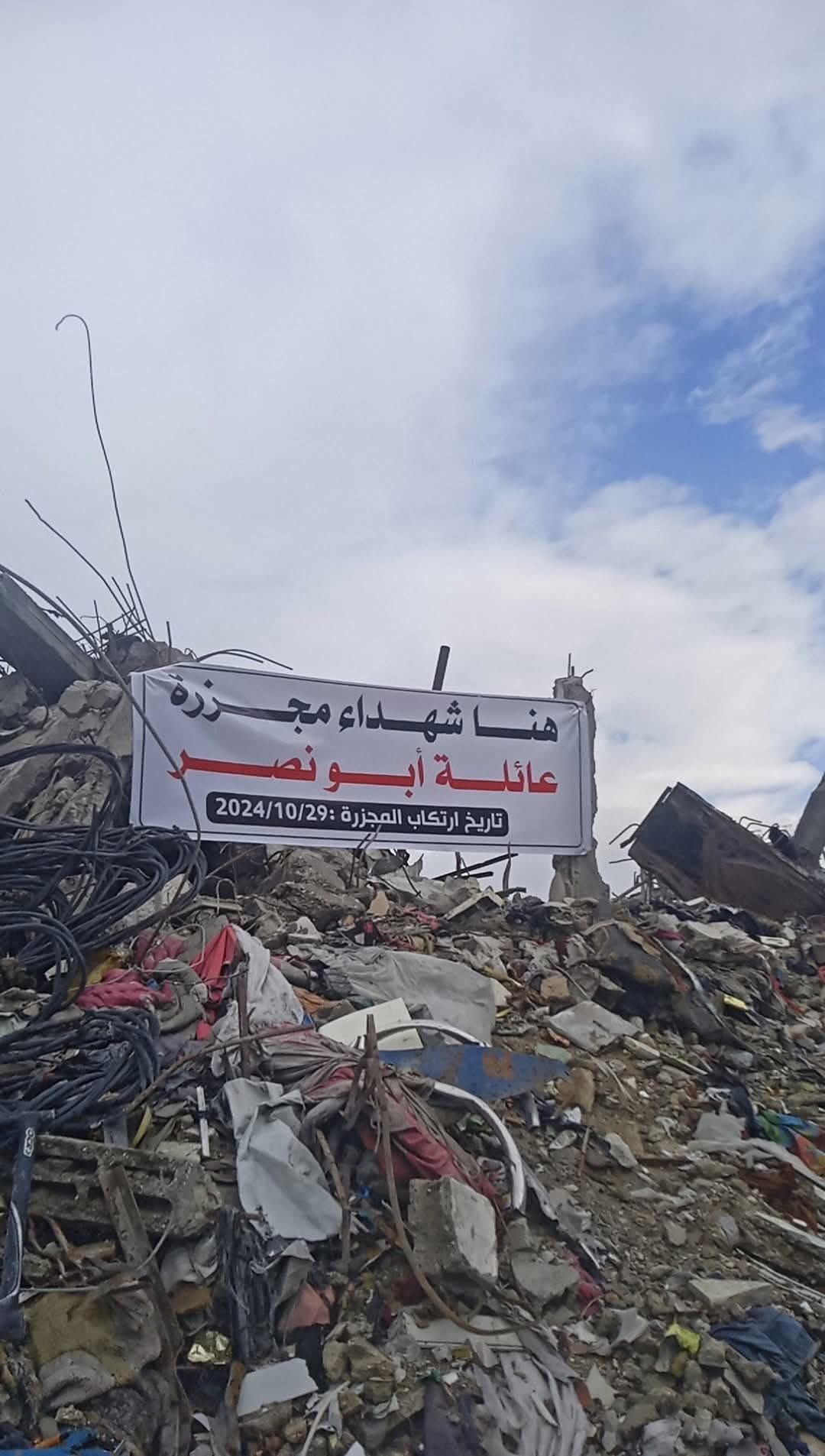
[Names of the martyrs (buried and some still under rubble):](https://x.com/Hamzaalnamla1/status/1852525405900538353)
1. Muhammad Issa Baraka Abu Nasr
2. Areej Marwan Issa Abu Nasr
3. Raed Muhammad Issa Abu Nasr
4. Ahmad Muhammad Issa Abu Nasr
5. Ayman Muhammad Issa Abu Nasr
6. Hema Ismail Abu Nasr
7. Rania Muhammad Issa Abu Nasr
8. Reham Muhammad Issa Abu Nasr
9. Sham Ahmad Muhammad Abu Nasr
10. Ramzi Nasr Khamis Abu Nasr
11. Hamza Ramzi Nasr Abu Nasr
12. Nasr Ramzi Nasr Abu Nasr
13. Suzan Nasr Khamis Abu Nasr
14. Nabil Hani Nabil Abu Nasr
15. Diaa Hani Nabil Abu Nasr
16. Hala Hani Nabil Abu Nasr
17. Hussein Hani Nabil Abu Nasr
18. Muhammad Nasr Khamis Abu Nasr
19. Kholoud Emad Ayesh Abu Nasr
20. Tala Muhammad Nasr Abu Nasr
21. Lara Muhammad Nasr Abu Nasr
22. Siwar Muhammad Nasr Abu Nasr
23. Salah Muhammad Nasr Abu Nasr
24. Sabreen Farah Baraka Abu Nasr
25. Malak Issa Nabil Abu Nasr
26. Marwa Issa Nabil Abu Nasr
27. Ghazal Issa Nabil Abu Nasr
28. Shahd Nidal Issa Abu Nasr
29. Manar Farah Baraka Abu Nasr
30. Muhammad Wael Adnan Abu Nasr
31. Issa Wael Adnan Abu Nasr
32. Muhammad Farah Baraka Abu Nasr
33. Manar Muhammad Farah Abu Nasr
34. Farah Muhammad Farah Abu Nasr
35. Marwan Farah Baraka Abu Nasr
36. Nabil Issa Baraka Abu Nasr
37. Fathiya Adnan Baraka Abu Nasr
38. Fathi Nabil Issa Abu Nasr
39. Haneen Nabil Issa Abu Nasr
40. Zein Ismail Abu Nasr
41. Soha Shawqi Issa Abu Nasr
42. Layan Hussam Nabil Abu Nasr
43. Bakr Hussam Nabil Abu Nasr
44. Yassin Hussam Nabil Abu Nasr
45. Moaz Hussam Nabil Abu Nasr
46. Aida Shawqi Issa Abu Nasr
47. Hoda Nabil Issa Abu Nasr
48. Ismail Muhammad Abu Nasr
49. May Muhammad Abu Nasr
50. Amira Muhammad Abu Nasr
51. Yusuf Muhammad Abu Nasr
52. Ali Muhammad Abu Nasr
53. Mahmoud Issa Baraka Abu Nasr
54. Soha Adnan Baraka Abu Nasr
55. Reem Mahmoud Issa Abu Nasr
56. Abdullah Mahmoud Issa Abu Nasr
57. Muhammad Mahmoud Issa Abu Nasr
58. Hoda Mahmoud Issa Abu Nasr
59. Amina Baraka Muhammad Abu Nasr
60. Nisreen Ayesh Mansour Abu Nasr
61. Israa Shadi Samir Abu Nasr
62. Othman Shadi Samir Abu Nasr
63. Muhammad Shadi Samir Abu Nasr
64. Ahmed Shadi Samir Abu Nasr
65. Imad Mouin Ayesh Abu Nasr
66. Anas Ashraf Ayesh Abu Nasr
67. Imad Ayesh Mansour Abu Nasr
68. Majda Ibrahim Abu Nasr
69. Najat Imad Ayesh Abu Nasr
70. Baraa Imad Ayesh Abu Nasr
71. Saeed Imad Ayesh Abu Nasr
72. Yazan Farid Shawqi Abu Nasr
73. Hadeel Farid Shawqi Abu Nasr
74. Fatima Adnan Baraka Abu Nasr
75. Alaa Issa Baraka Abu Nasr
76. Hassan Alaa Issa Abu Nasr
77. Muhammad Alaa Issa Abu Nasr
78. Ilham Ibrahim Abu Nasr
79. Zainab Muhammad Abu Nasr
80. Alaa Harb Asfoura (Abu Nasr)
81. Sahar Farah Baraka Asfoura (Abu Nasr)
82. Karam Alaa Asfoura (Abu Nasr)
83. Adam Alaa Asfoura (Abu Nasr)
84. Mustafa Alaa Asfoura (Abu Nasr)
85. Suhaib Alaa Asfoura (Abu Nasr)
86. Enas Alaa Asfoura (Abu Nasr)
87. Fidaa Nasr Khamis Abu Nasr
89. Shaza Kamal Nasr Abu Nasr
90. Nidal Issa Baraka Abu Nasr
91. Hamza Nidal Issa Abu Nasr
92. Noha Nidal Issa Abu Nasr
93. Nour Nidal Issa Abu Nasr
94. Muhammad Nidal Issa Abu Nasr
95. Ghada Issa Baraka Abu Nasr
96. Donia Muhammad Samir Abu Nasr
97. Nada Muhammad Samir Abu Nasr
98. Nada Muhammad Samir Abu Nasr
99. Aida Muhammad Samir Abu Nasr
100. Halima Muhammad Samir Abu Nasr
101. Rahaf Muhammad Samir Abu Nasr
102. Shadi Muhammad Samir Abu Nasr
103. Marwan Muhammad Samir Abu Nasr
104. Shawqi Issa Baraka Abu Nasr
105. Youssef Shawqi Issa Abu Nasr
106. Ibrahim Shawqi Issa Abu Nasr
107. Heba Shawqi Issa Abu Nasr
108. Yahya Shawqi Issa Abu Nasr
109. Hussein Muhammad Abu Nasr
110. Amal Muhammad Ibrahim Abu Nasr
111. Ali Muhammad Shawqi Abu Nasr
112. Obaida Muhammad Shawqi Abu Nasr
113. Doha Muhammad Shawqi Abu Nasr
114. Muhammad Ibrahim Abu Nasr
115. Ibrahim Muhammad Ibrahim Abu Nasr
116. Ismail Muhammad Ibrahim Abu Nasr
117. Aseel Muhammad Ibrahim Abu Nasr
118. Aya Muhammad Ibrahim Abu Nasr
119. Siwar Muhammad Ibrahim Abu Nasr
120. Zyad Ahmad Baraka Abu Nasr
121. Munir Jawdat Khamis Abu Nasr
122. Muhammad Munir Jawdat Abu Nasr
123. Ola Wael Adnan Abu Nasr
124. Yusuf Suhail Ayesh Abu Nasr
125. Ibrahim Saeed Abu Nasr
126. Fadi Ahmad Abu Nasr
#### Photos
"List of Abu Nasr Family Martyrs"
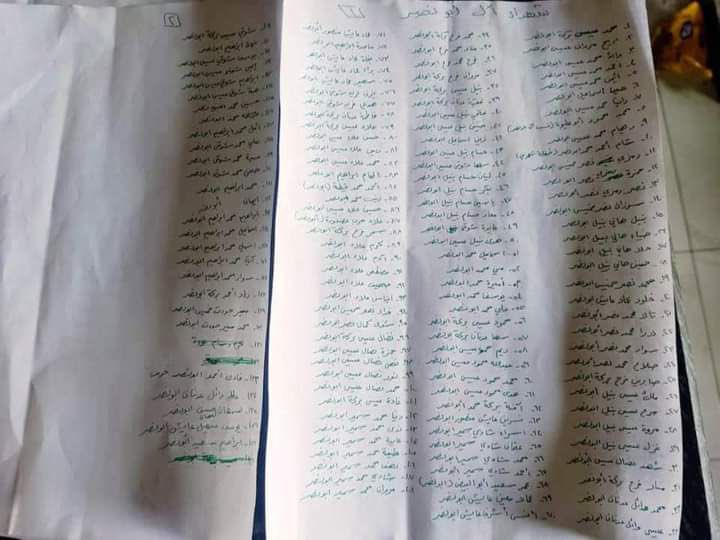
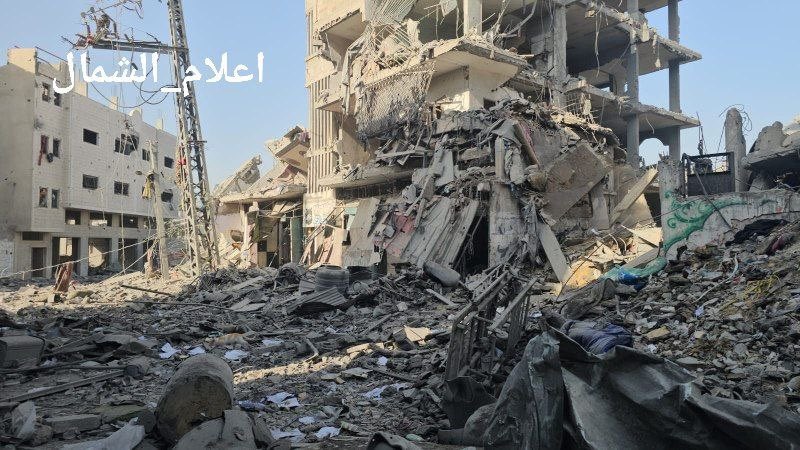
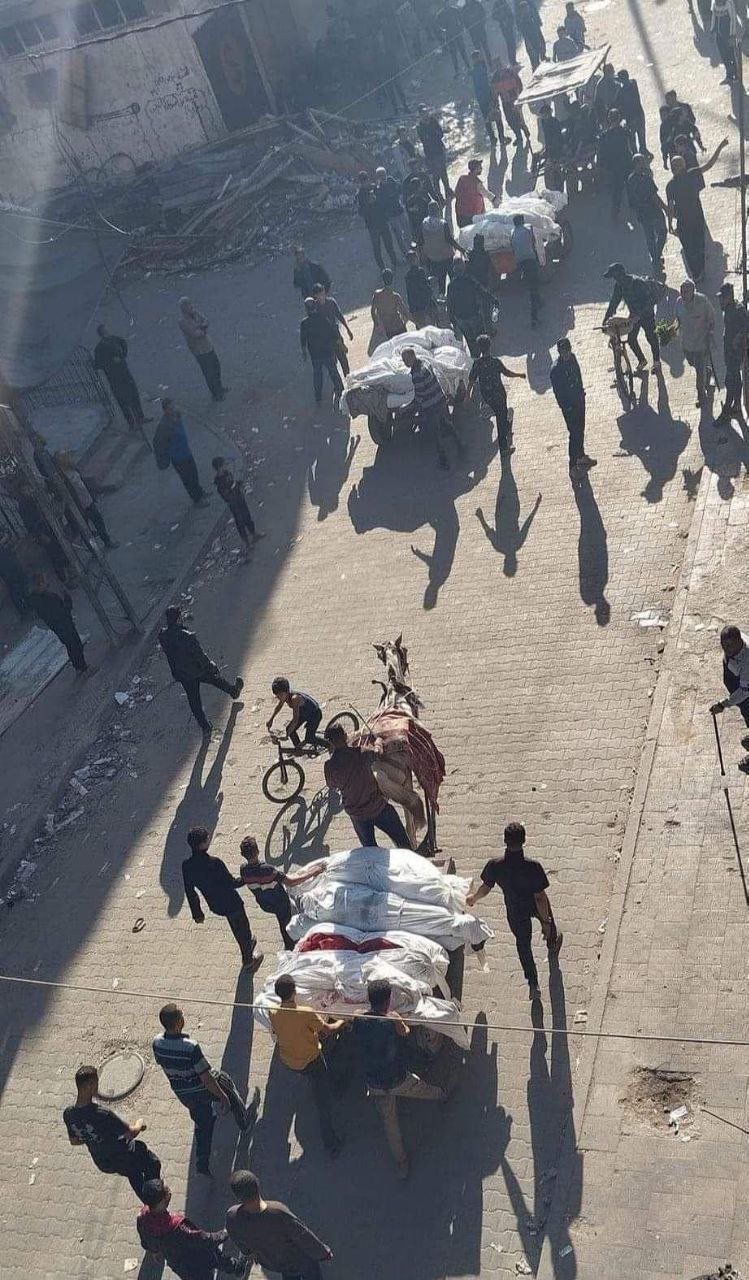
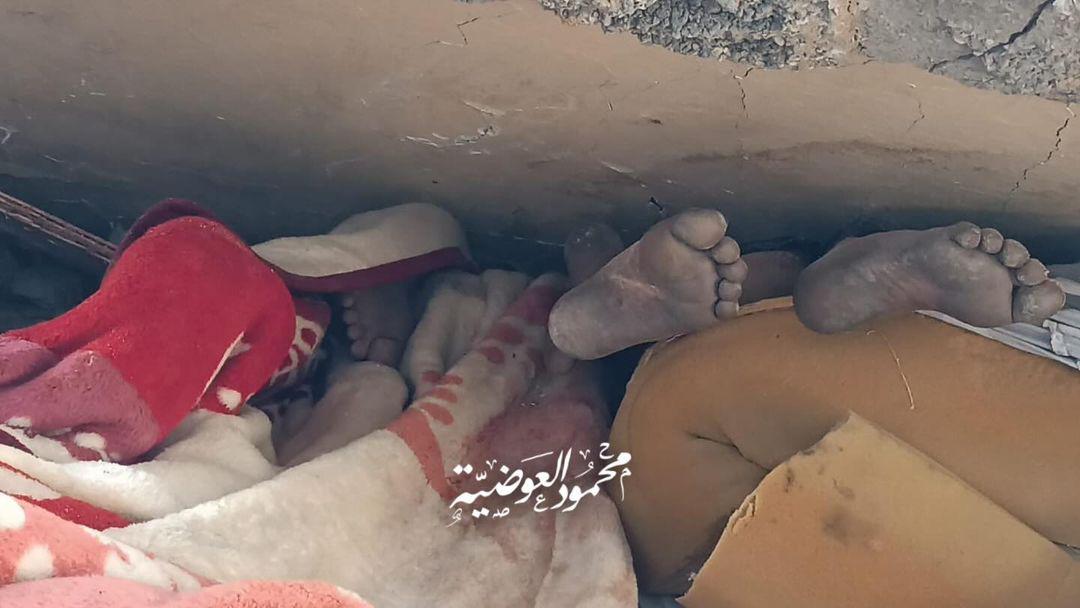

"*Those who died were saved, and those who were saved have died."

Asfoura family
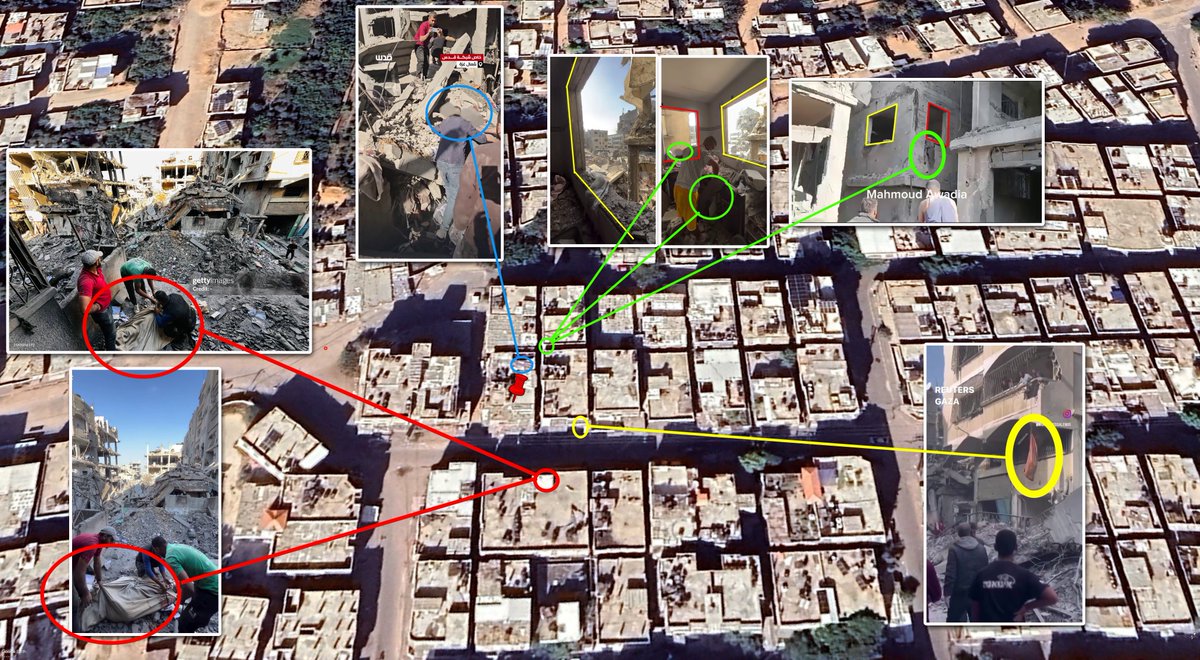Analysis showing victims being retrieved from 4 different building/homes
Sources: Mahmoud Awadia, Quds Net, AFP, Reuters
Day 389: North Gaza Invasion
Gaza, North Gaza
29 October, 2024
Day 25 of Israel's third ground invasion of the North Gaza governorate.
Since midnight, Israel perpetrated at least 2 major massacres against families in North Gaza amid its continued total blockade of aid, dismantlement of hospitals and overall healthcare and rescue services.
Journalist Anas Al-Sharif [summarized](https://x.com/AnasAlSharif0/status/1851169892675793380) the situation succintly: "*No cemeteries. No hospitals. No doctors. No civil defense. No first aid. People alive under the rubble that no one can get out."
Journalist Hossam Shabat [commented](https://x.com/HossamShabat/status/1851172938755526926) on the the absence of rescue crews caused by Israel's ethnic cleansing policies: "*The one hwo rescues me is my brother. The one who pulls me out of the rubble is my mother. The one who gives me treatment is my neighbor. They are injured and rescuers, and then may be martyred. Civilians are providing these services to themselves on the streets."
Journalist Mohamed Qirqea [said](): "*The injured bleed without any first aid! Hospitals are without doctors, and martyrs without shrouds. Markets and sidewalks have become cemeteries, and the streets are blocked by rubble, in a deliberate murder of the living in their neighborhoods. Yet, no one is listening."
#### Healthcare situation:

---
List of events harming civilians, infrastructure and living conditions:
#### Pre-dawn
- IDF [torches](https://x.com/AnasAlSharif0/status/1851030753045340485) the UNRWA Al-Fakhoura **school** in Jabalia
- Strike of **houses** belonging to the Obeid and Al-Omari families in Beit Lahia. [7 killed of whom 3 children](https://x.com/Hamzaalnamla1/status/1851031730209099790)
#### Morning
- Israeli strike on the Abu Nasr family home in Beit Lahia project. [Over 70 killed]
#### Night:
- Around [6:40 pm](https://x.com/dn_osama_rabee/status/1851303031549374786), an Israeli airstrike targeted a residential block in the vicinity of Salim Abu Musallam Mosque in Beit Lahia. The bombing leveled more than 3 houses of **Al-Louh family** to the ground. At least 16 people have been killed.
The details for each video come from social media. None of it has been verified.









